- Home
- Brandon Sanderson
Alcatraz vs. The Evil Librarians Page 2
Alcatraz vs. The Evil Librarians Read online
Page 2
Before we get to this, let me explain something about myself. I’ve been many things in my life. Student. Spy. Sacrifice. Potted plant. However, at this point, I’m something completely different from all of those—something more frightening than any of them.
I’m a writer.
You may have noticed that I began my story with a quick, snappy scene of danger and tension—but then quickly moved on to a more boring discussion of my childhood. Well, that’s because I wanted to prove something to you: that I am not a nice person.
Would a nice person begin with such an exciting scene, then make you wait almost the entire book to read about it? Would a nice person write a book that exposes the true nature of the world to all of you ignorant Hushlanders, thereby forcing your lives into chaos? Would a nice person write a book that proves that Alcatraz Smedry, the Free Kingdoms’ greatest hero, was just a mean-spirited adolescent?
Of course not.
I awoke grumpily that next morning, annoyed by the sound of someone banging on my downstairs door. I climbed out of bed, then threw on a bathrobe. Though the clock read 10:00 A.M., I was still tired. I had stayed up late, lost in thought. Then Joan and Roy had tried to say good-bye. I hadn’t opened my door to them. Better to get things over without all that gushing.
No, I was not happy to be reawoken at 10:00 A.M.—or, actually, any A.M. I yawned, walking downstairs and pulling open the door, prepared to meet whichever assistant Ms. Fletcher had sent to retrieve me. “Hell—” I said. (I hadn’t intended to swear, but a boisterous voice cut me off before I could get to the “o.”)
“Alcatraz, my boy!” the man at the doorway exclaimed. “Happy Birthday!”
“—o,” I said.
“You shouldn’t swear, my boy!” the man said, pushing his way into the house. He was an older man who was dressed in a sharp black tuxedo and wore a strange pair of red-tinted glasses. He was quite bald save for a small bit of white hair running around the back of his head, and this puffed out in an unkempt fashion. He wore a similarly bushy white mustache, and he smiled quite broadly as he turned to me, his face wrinkled but his eyes alight with excitement.
“Well, my boy,” he said, “how does it feel to be thirteen?”
“The same as it did yesterday,” I said, yawning. “When it was actually my birthday. Ms. Fletcher must have told you the wrong date. I’m not packed yet—you’re going to have to wait.”
I tiredly began to walk toward the stairs.
“Wait,” the old man said. “Your birthday was … yesterday?”
I nodded. I’d never met the man before, but Ms. Fletcher had several assistants. I didn’t know them all.
“Rumbling Rawns!” the man exclaimed. “I’m late!”
“No,” I said, climbing the stairs. “Actually, you’re early. As I said, you’ll need to wait.”
The old man rushed up the stairs behind me.
I turned, frowning. “You can wait downstairs.”
“Quickly, boy!” the old man said. “I can’t wait. Soon you’ll be getting a package in the mail, and—”
“Stop. You know about the package?”
“Of course I do, of course I do. Don’t tell me it already came?”
I nodded.
“Blistering Brooks!” the old man exclaimed. “Where, lad? Where is it?”
I frowned. “Did Ms. Fletcher send it?”
“Ms. Fletcher? Never heard of her. Your parents sent that box, my boy!”
He’s never heard of her? I thought, realizing that I’d never verified the man’s identity. Great. I’ve let a lunatic into the house.
“Oh, blast!” the old man said, reaching into his suit pocket and pulling out a pair of yellow-tinted glasses. He quickly exchanged the light red ones for these, then looked around. “There!” he said, rushing up the stairs, pushing past me.
“Hey!” I called, but he didn’t stop. I muttered quietly to myself, following. The old man was surprisingly spry for his age, and he reached the door to my room in just a few heartbeats.
“Is this your room, my boy?” the old man asked. “Lots of footprints leading here. What happened to the doorknob?”
“It fell off. My first night in the house.”
“How odd,” the old man said, pushing the door open. “Now, where’s that box…?”
“Look,” I said, pausing in the doorway. “You have to leave. If you don’t, I’m going to call the police.”
“The police? Why would you do that?”
“Because you’re in my house,” I said. “Well … my ex-house, at least.”
“But you let me in, lad,” the old man pointed out.
I paused. “Well, now I’m telling you to leave.”
“But why? Don’t you recognize me, my boy?”
I raised an eyebrow.
“I’m your grandfather, lad! Grandpa Smedry! Leavenworth Smedry, Oculator Dramatus. Don’t tell me you don’t remember me—I was there when you were born!”
I blinked. Then frowned. Then cocked my head to the side. “You were there…?”
“Yes, yes,” the old man said. “Thirteen years ago! You haven’t seen me since, of course.”
“And I’m supposed to remember you?” I said.
“Well, certainly! We have excellent memories, we Smedrys. Now, about that box…”
Grandfather? The man had to be lying, of course. I don’t even have parents. Why would I have a grandfather?
Now, looking back, I realize that this was a silly thought. Everybody has a grandfather—two of them, actually. Just because you haven’t seen them doesn’t mean they don’t exist. In that way, grandfathers are kind of like kangaroos.
At any rate, I most certainly should have called the police on this elderly intruder. He has been the main source of all my problems ever since. Unfortunately, I didn’t throw him out. Instead, I just watched him put away his yellow-tinted spectacles, retrieving the reddish-tinted ones again. Then he finally spotted the box on my dresser, scribbled-on brown paper still sitting beside it. The old man rushed over eagerly.
Did he send it? I wondered.
He reached into the box, taking out the note with an oddly reverent touch. He read it, smiling fondly, then looked up at me.
“So, where is it?” Grandpa Smedry—or whoever he really was—asked.
“Where is what?”
“The inheritance, lad!”
“In the box,” I said, pointing at the package.
“There isn’t anything in here but the note.”
“What?” I said, walking over. Indeed, the box was empty. The bag of sand was gone.
“What did you do with it?” I asked.
“With what?”
“The bag of sand,” I said.
The old man breathed out in awe. “So, it really came?” he whispered, eyes wide. “There was actually a bag of sand in this box?”
I nodded slowly.
“What color was the sand, lad?”
“Um … sandy?”
“Galloping Gemmells!” he exclaimed. “I’m too late! They must have gotten here before me. Quickly, lad. Who’s been in this room since you received the box?”
“Nobody,” I said. By this point, as you can imagine, I was growing a little frustrated and increasingly confused. Not to mention hungry and still a bit tired. And a little sore from gym class the previous week—but that isn’t exactly all that relevant, is it?
“Nobody?” the old man repeated. “Nobody else has been in this room?”
“Nobody,” I snapped. “Nobody at all.” Except … I frowned. “Except Ms. Fletcher.”
“Who is this Ms. Fletcher you keep mentioning, lad?”
I shrugged. “My caseworker.”
“What does she look like?”
“Glasses,” I said. “Snobbish face. Usually has her hair in a bun.”
“The glasses,” Grandpa Smedry said slowly. “Did they have … horn rims?”
“Usually.”
“Hyperventilating Hobbs!” he excla
imed. “A Librarian! Quickly, lad, we have to go! Get dressed; I’ll go steal some food from your foster parents!”
“Wait!” I said, but the old man had already scrambled from the room, moving with a sudden urgency.
I stood, dumbfounded.
Ms. Fletcher? I thought. Take the inheritance? That’s stupid. Why would she want a silly bag of sand? I shook my head, uncertain what to make of all this. Finally, I just walked over to my dresser. Getting dressed, at least, seemed like a good idea. I threw on a pair of jeans, a T-shirt, and my favorite green jacket.
As I finished, Grandpa Smedry rushed back into my bedroom, carrying two of Roy’s extra briefcases. I noticed a leaf of lettuce sticking halfway out of one, while the other seemed to be leaking a bit of ketchup.
“Here!” Grandpa Smedry said, handing me the lettuce briefcase. “I packed us lunches. No telling how long it will be before we can stop for food!”
I raised the briefcase, frowning. “You packed lunches inside of briefcases?”
“They’ll look less suspicious that way. We have to fit in! Now, let’s get moving. The Librarians could already be working on that sand.”
“So?” I said.
“So!” the old man exclaimed. “Lad, with those sands, the Librarians could destroy kingdoms, overthrow cultures, dominate the world! We need to get them back. We’ll have to strike quickly, and possibly at great peril to our lives. But that’s the Smedry way!”
I lowered the briefcase. “If you say so.”
“Before we leave, I need to know what our resources are. What’s your Talent, lad?”
I frowned. “Talent?”
“Yes,” Grandpa Smedry said. “Every Smedry has a Talent. What is yours?”
“Uh … playing the oboe?”
“This is no time for jokes, lad!” Grandpa Smedry said. “This is serious! If we don’t get that sand back…”
“Well,” I said, sighing. “I’m pretty good at breaking things.”
Grandpa Smedry froze.
Maybe I shouldn’t play with the old man, I thought, feeling guilty. He may be a loon, but that’s no reason to make fun of him.
“Breaking things?” Grandpa Smedry said, sounding awed. “So it’s true. Why, such a Talent hasn’t been seen in centuries.…”
“Look,” I said, raising my hands. “I was just joking around. I didn’t mean—”
“I knew it!” Grandpa Smedry said eagerly. “Yes, yes, this improves our chances! Come, lad, we have to get moving.” He turned and left the room again, carrying his briefcase and rushing eagerly down the stairs.
“Wait!” I cried, chasing after the old man. However, when I reached the doorway, I paused.
There was a car parked on the curb outside. An old car. Now, when you read the words old car, you likely think of a beat-up or rusted vehicle that barely runs. A car that is old, kind of in the same way that cassette tapes are old.
This was not such a car. It was not old like cassette tapes are old—it wasn’t even old like records are old. No, this car was old like Beethoven is old. Or at least so it seemed. To me—and likely to most of you living in the Hushlands—the car looked like an antique. Kind of like a Model T.
But that was just my assumption.
The point is that many times, the first thing a person presumes about something—or someone—is inaccurate. Or at the very least incomplete. Take the young Alcatraz Smedry, for instance. After reading my story up to this point, you have probably made some assumptions. Perhaps you’re—despite my best efforts—feeling a bit of sympathy for me. After all, orphans usually make very sympathetic heroes.
Perhaps you think that my habit of using sarcasm is simply a method of hiding my insecurity. Perhaps you’ve decided that I wasn’t a cruel boy, just a very confused one. Perhaps you’ve decided, despite my feigned indifference, I didn’t like breaking things.
Obviously, you are a person of very poor judgment. I would ask you to kindly refrain from drawing conclusions that I don’t explicitly tell you to make. That’s a very bad habit, and it makes authors grumpy.
I was none of those things. I was simply a mean boy who didn’t really care whether or not he burned down kitchens. And that mean boy was the one who stood on the doorstep, watching Grandpa Smedry waving eagerly for him to follow.
Now, perhaps I’ll admit that I felt just a little bit of longing. A … wishfulness, you might say. Getting a package that claimed to be from my parents had made me remember days long ago—before I realized how foolish I was being—when I had yearned to know my real parents. Days when I had longed to find someone who had to love me, if only because they were related to me.
Fortunately, I had outgrown those feelings. My moment of weakness passed quickly, and I slammed the door closed and locked the old man outside. Then I went to the kitchen to get some breakfast.
That, however, is when someone drew a gun on me.
Chapter
3
I’d like to take this opportunity to point out something important. Should a strange old man of questionable sanity show up at your door—suggesting that he is your grandfather and that you should accompany him upon some quest of mystical import—you should flatly refuse him.
Don’t take his candy either.
Unfortunately, as you will soon see, I was quickly forced to break this rule. Please don’t hold it against me. It was done under duress. I’m really not used to being shot at.
I walked tiredly into the kitchen—which still smelled of smoke—hoping that the strange old man wouldn’t take to pounding on the door. I didn’t really want to call the police on him—not only would I likely break the telephone in the process (I’m particularly bad with phones) but I really didn’t want the old loon carted away in a police car. That would have been—
“Alcatraz Smedry?” a voice suddenly asked.
I jumped, turning from the half-burned cupboard, a box of cornflakes in my hand. A man stood in the doorway behind me, wearing slacks and a button-down shirt. I frowned, realizing that I recognized the symbol on the man’s shirt pocket and standard-issue attaché case. He was a foster care caseworker—this was the man that Ms. Fletcher had sent to pick me up from the house. I realized that when I’d originally gone chasing the old man up to my room, I’d left the front door open. The caseworker must have come in looking for me while I was upstairs chatting with the lunatic.
“Hi,” I said, putting down the box. “I’ll be ready in a bit—let me have breakfast first.”
“You’re him, then?” the caseworker asked, adjusting his horn-rimmed glasses. “The Smedry kid?”
I nodded.
“Good,” the man said, then pulled a gun out of his attaché case and raised it toward me. It had a silencer on the barrel.
I froze, shocked. (And don’t try to claim that you did anything different the first time a government bureaucrat pulled a gun on you.)
Fortunately, I eventually found my tongue. “Wait!” I said, raising my hands. “What are you doing?”
“Thanks for the sands, kid,” the man said, and moved as if to pull the trigger.
At that moment something massive crashed through the wall of my house—something that looked a lot like the front end of an old Model T Ford. I cried out, dodging to the side, and the caseworker stumbled to the ground in the chaos.
The man who called himself Grandpa Smedry sat happily in the driver’s seat. A chunk of smoke-damaged ceiling fell down onto the hood of the car, throwing up a puff of white dust. The old man poked his head out the window.
“Lad,” he said, “might I point out that you have two choices right now? You can get in the car with me, or you can stay here with the man holding a gun.”
I stood, dazed.
“You really don’t have much time to decide,” Grandpa Smedry said, leaning toward me, speaking in a kind of half whisper, as if he were sharing some great secret.
Now, I’d like to pause here and note that Grandpa Smedry was lying to me. I didn’t have only two choi
ces at that point—I had quite a few more than that. True, I could have chosen to stay in the room and get shot. I also could have chosen to get in the car. However, there were lots of other things I could have done. For instance, I could have run around the house flapping my arms and pretending that I was a penguin. The logical choice to make in this situation would have been to call the police on both of those maniacs.
Unfortunately, I didn’t think of penguins or police and instead did as Grandpa Smedry said, scrambling over and getting into the car.
As I stated at the beginning of the chapter, I really shouldn’t have done this. I was soon to learn the dangers involved in following strange old men on quests. I don’t want to give away any more of the story, but let me say that my fate at this point took a sharp turn toward altars, sacrifices, and evil Librarians.
And possibly some sharks.
The car backed out of the house, the tires leaving tracks in the lawn. I sat in the front passenger seat, still stunned, looking at the wreckage of the Sheldons’ house. Bits of siding were falling off the outside wall, crushing Roy’s prize tulips. This was more damage than I’d ever done to any foster home. This time it wasn’t directly my fault, but … well, that didn’t change the fact that the kitchen was no longer merely burned but also had quite a large hole in it.
We turned onto the street in front of the house—the car puttering along at a modest speed. The caseworker didn’t chase after us, but that didn’t stop me from watching anxiously until the house disappeared in the distance.
Someone just tried to kill me, I thought, feeling numb. You may find if hard to believe—considering the number of things I’d broken in my life—but this was the first time someone had actually tried to shoot me. It was an unsettling feeling. A little like the way you feel when you have the flu. Maybe there’s a connection.
“Well, that was exciting!” Grandpa Smedry said.
I was still staring out the window. The street passed outside, a suburban neighborhood distinctive only in that it looked pretty much like every other one in the nation. Calm two-story houses. Green lawns. Oak trees, shrubs, flower beds, all carefully maintained.

 Steelheart
Steelheart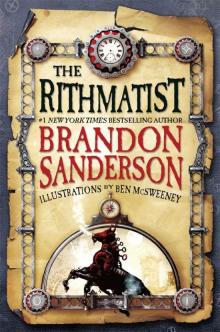 The Rithmatist
The Rithmatist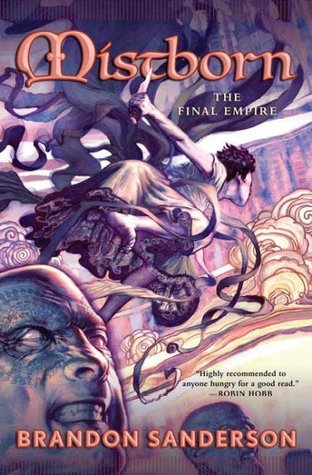 Mistborn: The Final Empire
Mistborn: The Final Empire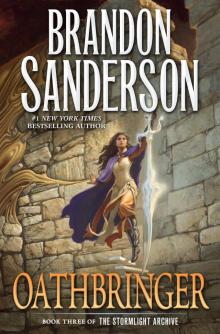 Oathbringer
Oathbringer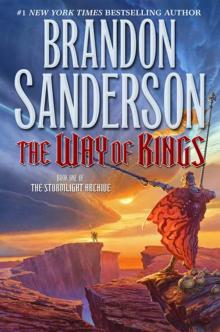 The Way of Kings
The Way of Kings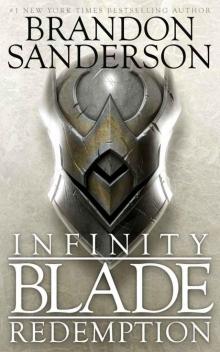 Redemption
Redemption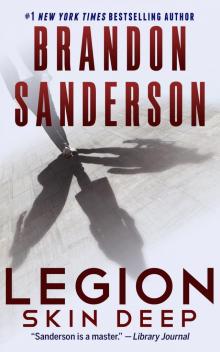 Skin Deep
Skin Deep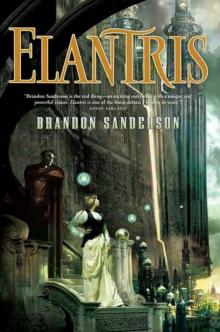 Elantris
Elantris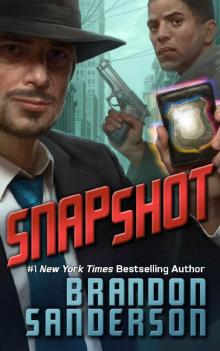 Snapshot
Snapshot Sixth of the Dusk (Cosmere)
Sixth of the Dusk (Cosmere)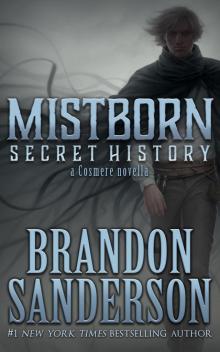 Mistborn: Secret History
Mistborn: Secret History White Sand, Volume 1
White Sand, Volume 1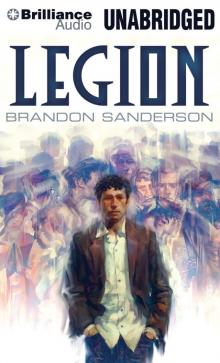 Legion
Legion The Well of Ascension
The Well of Ascension The Bands of Mourning
The Bands of Mourning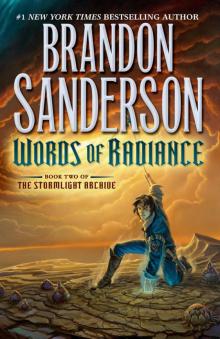 Words of Radiance
Words of Radiance The Hero of Ages
The Hero of Ages Calamity
Calamity Alcatraz Versus the Scrivener's Bones
Alcatraz Versus the Scrivener's Bones The Alloy of Law
The Alloy of Law The Emperors Soul
The Emperors Soul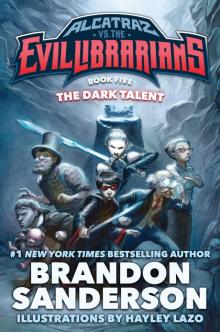 The Dark Talent
The Dark Talent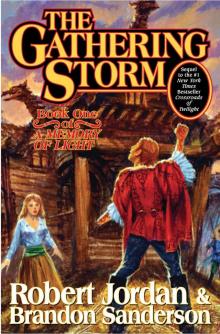 The Gathering Storm
The Gathering Storm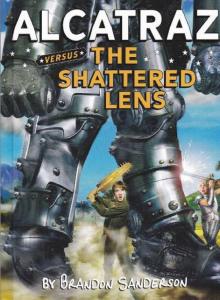 Alcatraz Versus the Shattered Lens
Alcatraz Versus the Shattered Lens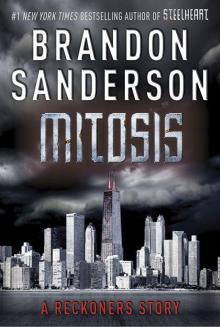 Mitosis
Mitosis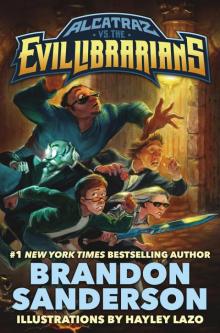 Alcatraz vs. The Evil Librarians
Alcatraz vs. The Evil Librarians Rhythm of War (9781429952040)
Rhythm of War (9781429952040)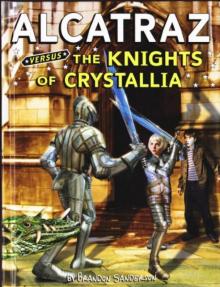 Alcatraz Versus the Knights of Crystallia
Alcatraz Versus the Knights of Crystallia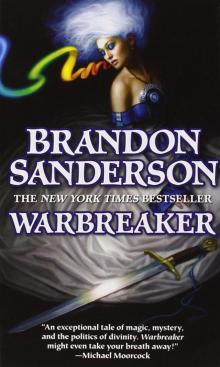 Warbreaker
Warbreaker Firstborn
Firstborn Starsight
Starsight Edgedancer
Edgedancer Perfect State
Perfect State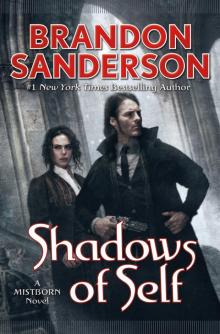 Shadows of Self
Shadows of Self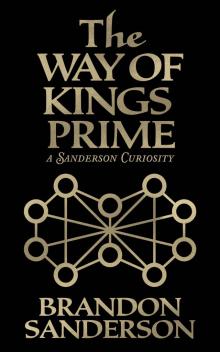 The Way of Kings Prime
The Way of Kings Prime Starsight (US)
Starsight (US) Shadows for Silence in the Forests of Hell
Shadows for Silence in the Forests of Hell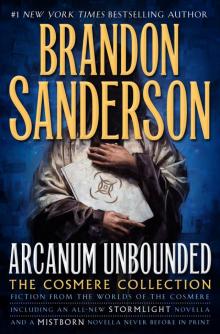 Arcanum Unbounded: The Cosmere Collection
Arcanum Unbounded: The Cosmere Collection Awakening
Awakening Firefight
Firefight Dawnshard
Dawnshard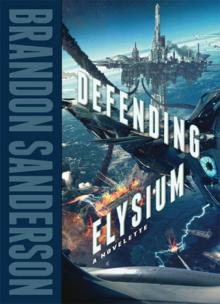 Defending Elysium
Defending Elysium White Sand
White Sand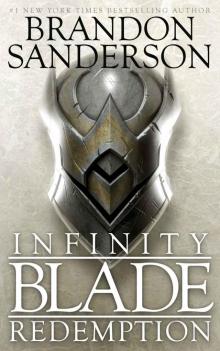 Infinity Blade: Redemption
Infinity Blade: Redemption The Final Empire
The Final Empire Skyward
Skyward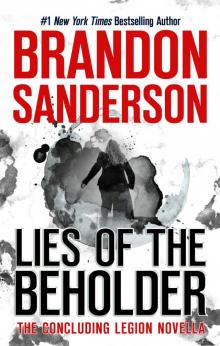 Lies of the Beholder
Lies of the Beholder Elantris e-1
Elantris e-1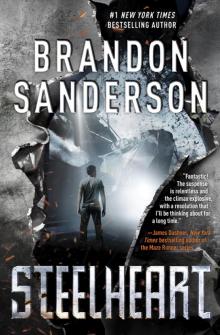 Steelheart r-1
Steelheart r-1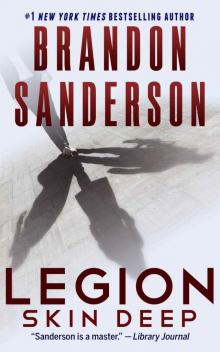 Legion: Skin Deep
Legion: Skin Deep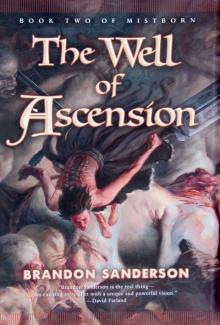 Well of Ascension
Well of Ascension Mistborn
Mistborn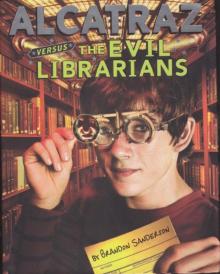 Alcatraz versus the Evil Librarians
Alcatraz versus the Evil Librarians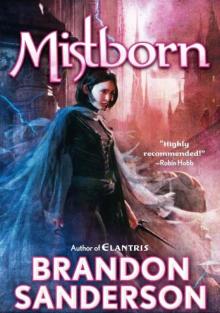 The Final Empire m-1
The Final Empire m-1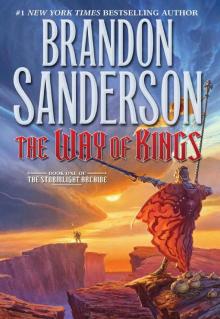 The Way of Kings (Stormlight Archive, The)
The Way of Kings (Stormlight Archive, The) Calamity (The Reckoners)
Calamity (The Reckoners) Legion and the Emperor's Soul
Legion and the Emperor's Soul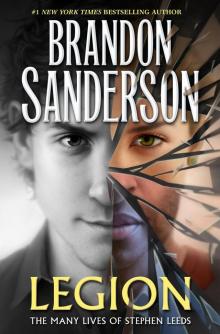 Legion: The Many Lives of Stephen Leeds
Legion: The Many Lives of Stephen Leeds The Mistborn Trilogy
The Mistborn Trilogy Bands of Mourning
Bands of Mourning Alcatraz
Alcatraz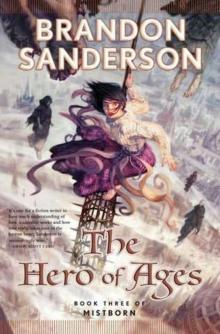 The Hero of Ages m-3
The Hero of Ages m-3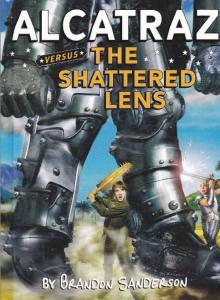 Alcatraz vs. the Shattered Lens
Alcatraz vs. the Shattered Lens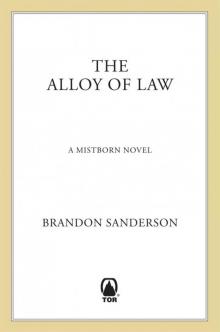 The Alloy of Law: A Mistborn Novel
The Alloy of Law: A Mistborn Novel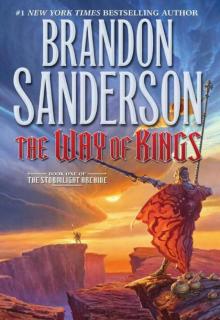 The Way of Kings sa-1
The Way of Kings sa-1 Infinity Blade: Awakening
Infinity Blade: Awakening Sixth of the Dusk
Sixth of the Dusk The Stormlight Archive
The Stormlight Archive The Aether of Night
The Aether of Night